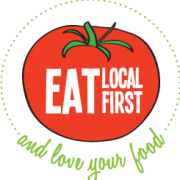Are We Certified Organic?
We get the question pretty much daily, “So are your farms Certified Organic?” It’s a hard question to answer briefly because there is a lot that goes on behind the scenes in U.S. Agriculture, and there are also a lot of misconceptions about Organic Produce. In short, we do not require that our local farms be Certified Organic. Does this mean that our food is less safe? Absolutely not. In fact, we contest that our produce is safer and packed with more nutrients than much of the Certified Organic produce that you can buy in grocery stores.
We partner with local farmers, many of whom are multi-generational. That means that they treat their farms, crops and animals with the utmost care and respect, acting as stewards of the land. These farmers are able to continue farming on their family farms generation after generation because their practices are sustainable. The farmers use rotational crop systems, so as to not rob the ground of its nutrients. The vast majority of our farms do not spray at all, because doing so would jeopardize the integrity of their land. If they do spray, it is minimal and only as required. For example, one of our sustainable farmers has a friend who runs a Certified Organic farm not far from him. Last year, our farmer sprayed his yellow squash one time all season because it was necessary. His Organic friend however, sprayed his squash on a weekly schedule using a spray that is approved by the USDA. Our farmer isn’t considered Certified Organic, but his weekly spraying friend is allowed to use that title. On a larger scale, “it’s important to remember that “organic” doesn’t mean the food is grown locally—it may even be grown in a foreign country and shipped to the U.S. resulting in a larger carbon footprint and smaller benefit to the environment. There’s also no guarantee that the food was produced under ideal conditions for farmers, laborers, or livestock, and an organic label has nothing to do with food safety.” [http://www.sonima.com/live-fresh/clean-diet/]
There is currently a movement called “Local First. Certification Second.” This movement focuses on knowing your Farmer, which we at Seasonal Roots fully support. We know our farmers; we talk with them, visit their farms, and develop relationships with them. We do our best to share their stories with you each week, so that you can know them too, even if you don’t have time to go visit them yourself. According to the Lexicon of Sustainability, “Knowing who grows your food locally can be more valuable than any certification or stamp of approval.”
Eating local food is so important for our health and well being because “most nutrients begin to degrade the moment a fresh piece of produce is picked, so the sooner it gets to you the better. Many studies have shown that a peach or berry picked closer to ripeness is more nutritious than a fruit—organic or not—picked before or after its peak of ripeness.” [http://time.com/2970505/organic-misconception-local/ ] This is why we strive to get you your produce as soon as possible after harvesting. Much of the food in grocery stores has traveled hundreds or even thousands of miles to get there, losing nutrients every mile of the way. Our food is local, which by our standards is within 150 miles of our Food Hub in Central Virginia. It is harvested by farmers on Tuesdays and heads your way on Wednesdays and Thursdays. 48 Hours Dirt to Doorstep allows for a level of nutrient packed food that we are proud to offer.
We support our local farmers because we know and trust them and their practices. They produce safe food for their families, our families and your families. That is a policy that we can get behind, Certified Organic or not. Thank you for helping us support local farmers, and our farmers show their appreciation by providing all of us with some of the very best produce and animal products within 150 miles.


